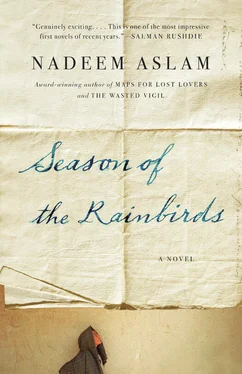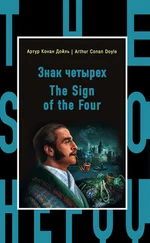Azhar had developed a taste for the dish during his student days in Lahore. ‘I agree with Imran Khan,’ he had often said, ‘the best food in the world is sold on the footpaths of Lahore.’ And the best in Lahore, according to Azhar, were the stalls in the hira mundi — that crimson lily floating in the dark waters of the Punjabi nights. No one doubted him: it could easily be believed that pimps and nykas, men and women whose business it was to gratify every desire, would only allow the best cooks to populate their streets.
Elizabeth gathered up her hair clear of her shoulders, leaving her earlobes visible, and secured it with two twists of a rubber-band. She unwrapped the five trotters tied with coarse twine and lifted them to her nose to check for freshness. The smell was that of a recent wound. Satisfied, she cut the twine and placed the bony stumps widely spaced on the grill. She lit the fire underneath. The hairs curled and were gone instantly. The stench of burnt hair saturated the small kitchen. Elizabeth held her breath and prodded the stumpy bones with the knife.
Standing outside on the portico, about to knock, Mujeeb Ali too was overwhelmed by the smell of burning protein, dense and cloying. He frowned and knocked. Elizabeth turned off the fire, put the knife on the table with the other hand, and cast around for her slippers.
When she opened the door, Mujeeb Ali pushed her aside and stepped into the house. He crossed the courtyard with an even stride; only on reaching the veranda out of the echoing sun, did he turn around.
‘Where’s Azhar?’
The reply, too, was not immediate. Elizabeth pulled the door shut but did not fasten the bolt. ‘He’s out of town,’ she said, glancing up at Mujeeb Ali as she came in out of the disabling heat.
‘But the car is parked outside.’
Elizabeth cleared her throat softly. She explained that Azhar had taken Gul-kalam to Arrubakook in the police van.
Mujeeb Ali nodded. He stood a couple of paces to Elizabeth’s left — set beside her slender form he seemed a colossus. He examined her openly from head to foot and said, ‘Are you the maid?’
There was no reply. Instead Elizabeth briefly held Mujeeb Ali’s gaze. Then she averted her eyes.
‘No,’ he answered himself. ‘Of course you aren’t.’ No emotion seemed to inform his voice. Nor did his face register any expression. After a brief pause he said, ‘Don’t you have a stole?’ He was pointing at her head, indicating that she was bare-headed before a male stranger.
She went to the back of the veranda and took down her stole from the hook. It was the same green colour as the chenille of her shirt. She draped it across her shoulders, her head still defiantly bare. Her features were rigid.
‘Would you like a cup of tea?’ she asked.
‘No.’
‘Don’t worry,’ she smiled, ‘you’ll be served in the cup out of which the Muslims of the house drink.’
‘Watch what you’re saying, girl,’ Mujeeb Ali said sharply. ‘I don’t drink tea at this hour, that’s all. Anything else has nothing to do with it.’ And after a pause he added: ‘My servants eat out of the same plates as me and my children. Only the people who come in to clean the gutters and unblock the drains have their things kept separate. But that’s because they go down into filth, not because they’re Christians.’
‘I know,’ said Elizabeth. ‘My father cleans sewers.’
Their glances disengaged. Mujeeb Ali took out a handkerchief and dabbed his eyes, his skin shone with sweat. ‘And what does your father think of this ?’ he asked without looking at Elizabeth. He had pointed at Elizabeth’s clothes drying on the washing line.
There was a silence.
Mujeeb Ali returned the handkerchief to his pocket. ‘You should convert and get him to marry you.’
Elizabeth looked up. ‘I’d do it if Azhar asked me.’ She spoke firmly. ‘I won’t do it so that others can sleep easy at night.’
Mujeeb Ali nodded slowly. He made a noise at the back of his throat and, becoming aware of the burnt hair once more, expelled the air from his lungs. He said, and this time he spoke politely, ‘Tell Azhar that I called. Ask him to come and see me when he returns.’
Elizabeth too softened her voice. ‘He’s returning late at night,’ she said. ‘It will have to be tomorrow.’
The sun was entering the second half of its arc. Mujeeb Ali walked past the shut-up houses sleeping their siestas, past the straggly lime hedges.
As he neared his own house he saw Maulana Hafeez in the distance. The cleric was raising his hand and hurrying towards him. He came up close and they shook hands.
Maulana Hafeez let himself be ushered into the shade of a talli growing by the edge of the street and closed his umbrella, the canopy collapsing like a fleeing jellyfish. ‘I have just been told about the postmaster …’ He left the sentence unfinished, accusingly.
‘Forgive me, Maulana-ji, but those letters had to be looked at. We agreed about that on Saturday night. He said he didn’t have them but I knew that he was lying. And I was right.’
Maulana Hafeez said, ‘But you promised me. And that poor woman …’ Mujeeb Ali started to speak but Maulana Hafeez placed a hand on his forearm. ‘I must have your assurance that if he does come back you won’t harm him.’ There was lunch on his breath and the skin around his eyes was still taut from his recent sleep.
Mujeeb Ali nodded half-heartedly and dabbed at his brow.
‘It is hot,’ Maulana Hafeez said. ‘But I had to come and find you. Nabila said you weren’t in.’
‘I didn’t mean to trouble you, Maulana-ji. But I was round at the deputy commissioner’s house.’
Maulana Hafeez moved his hand to Mujeeb Ali’s shoulder. ‘I’ve been looking for him since yesterday. Is he back?’
Mujeeb Ali shook his head.
Maulana Hafeez released him. He lowered his head, looking at his shoes: on each foot the joint of the second toe peeped out of the hole made in the leather. ‘I think you should talk to him, Mujeeb,’ he said quietly. ‘Get him to … mend his ways.’
Mujeeb Ali did not respond. He inhaled the attar gently released from Maulana Hafeez’s clothes by the heat.
‘Yes.’ Maulana Hafeez spoke as though Mujeeb Ali had replied. ‘He should mend his ways. He’s an educated man. He should make us see that education doesn’t mean you forget the difference between heresy and faith.’
Mujeeb Ali was edging towards the rim of the talli’s shadow. ‘We’ll see what can be done, Maulana-ji.’
The cleric felt for the catch on the umbrella. ‘And do you know what would make me really happy? If both of you were to find time to come to the mosque one of these days. Then I’d be able to hold my head up in the street. I know you’re busy people but …’
Mujeeb Ali had given a little nod and was walking away.
Maulana Hafeez, his umbrella unfurled, watched him until he disappeared into the great marble house that dominated one side of the street. Then, ordering his thoughts, he began walking slowly back towards the mosque.

The boy set the four cups of coffee on the tray and, boldly balancing the tray on his splayed left hand, began to cross the street. The doors and windows of the courthouse were shut, only an occasional figure was to be seen wandering among the empty arches. The typists dozed in their chairs, wrists dangling near the ground. A herd of water buffaloes had come to rest under the trees on the river embankment. The beasts stood motionless, muzzle to flank, transfixed by the great heat. The boy went into Yusuf Rao’s office. Ignoring both Yusuf Rao and Mr Kasmi, who was visiting, he made a slight bow towards the two men he had earlier seen arrive by car. He transferred the cups on to the table. Then he gathered up the lunch dishes and quietly withdrew. Outside he lingered around the car, touching the creamy paintwork and examining the tyres and peering through the windows, until his father’s shout from across the street pulled him away.
Читать дальше













